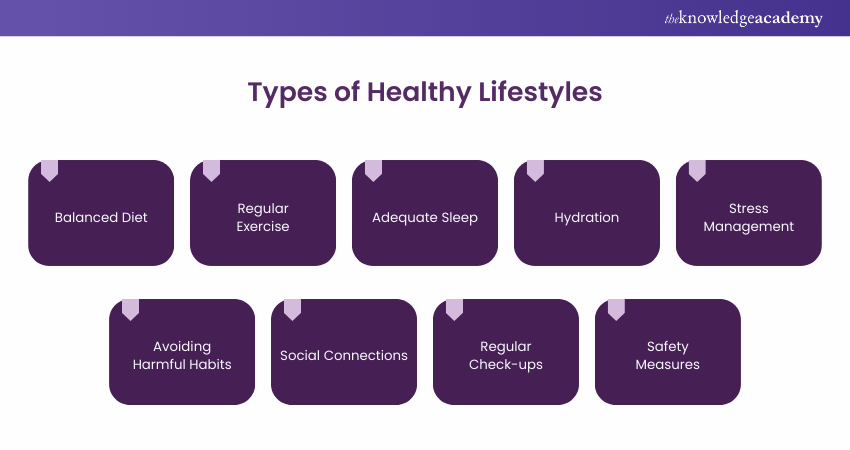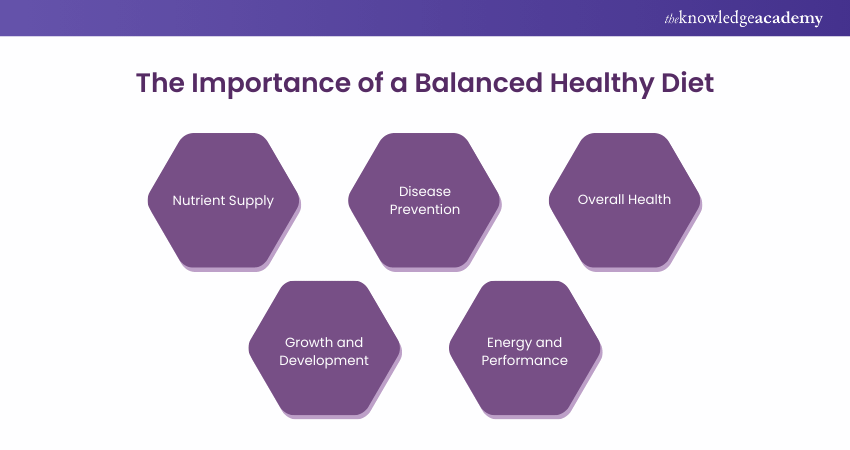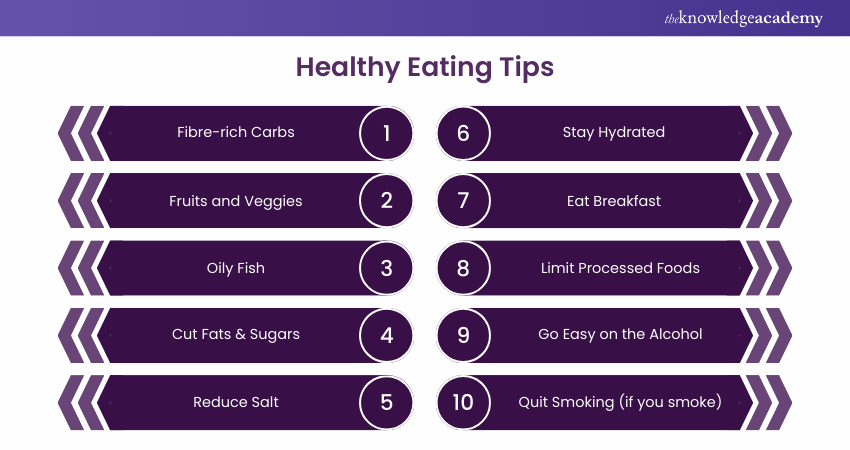We may not have the course you’re looking for. If you enquire or give us a call on +0800 780004 and speak to our training experts, we may still be able to help with your training requirements.
Training Outcomes Within Your Budget!
We ensure quality, budget-alignment, and timely delivery by our expert instructors.

In a world where fast food outlets are more prevalent than fitness centres, and stress is widespread, the question arises: “What is a Healthy Lifestyle?” This inquiry isn’t merely a transient consideration; it’s a significant matter resonating with countless individuals. A Healthy Lifestyle embodies a comprehensive philosophy of life that transcends mere calorie tracking, focusing instead on overall wellness.
But, the path to a Healthy Lifestyle is often littered with conflicting advice and a general sense of confusion. Hence, this blog aims to give you some crucial health tips. So, let's read this extensive blog to lead a better life.
Table of Contents
1) What is a Healthy Lifestyle?
2) Types of Healthy Lifestyles
3) The Importance of a Balanced Healthy Diet
4) Healthy Eating Tips
5) Conclusion
What is a Healthy Lifestyle?
A Healthy Lifestyle includes a wide angle of perspectives on physical, mental and spiritual health. It covers aspects like being aware of what we eat or drink or practising mental healing or spiritual nourishment to enrich our lives. By practising healthy behaviours and making self-care a priority, people can improve the quality of their lives and ward off chronic conditions.
How Important is Staying Active?
Staying active is essential for sustaining overall health and well-being. It offers immediate benefits like enhanced mood and better sleep quality, as well as long-term advantages such as a lower risk of developing conditions like heart disease and type 2 diabetes. Regular physical activity also aids weight management, helping to balance the calories we consume with those we expend.
Moreover, staying active boosts cardiovascular health, with recommendations suggesting at least 150 minutes of moderate exercise weekly to significantly reduce heart disease risk. Mental health benefits greatly from exercise, too. An active lifestyle often leads to a longer life, as regular physical activity enhances overall quality of life. Embracing a routine that includes activities can lead to a healthier, more fulfilling life.
Types of Healthy Lifestyles
A Healthy Lifestyle includes making positive choices that improve physical, mental, and emotional well-being. Here are various types of Healthy Lifestyles to consider for a balanced and fulfilling life.

a) Balanced Diet: Eating various fruits, vegetables, and whole grains. This helps your body get the nutrients it needs.
b) Regular Exercise: Walking, jogging, or doing Yoga keeps your body strong. It enhances your mood and energy levels.
c) Adequate Sleep: Getting enough sleep each night is important. It helps your body and mind recover and stay healthy.
d) Hydration: Drinking plenty of water keeps you hydrated. It helps your body function properly.
e) Stress Management: Doing relaxation exercises like Meditation can reduce stress. It makes you feel calmer and happier.
f) Avoiding Harmful Habits: Not smoking or drinking too much alcohol is good for your health. It lowers the risk of many diseases.
g) Social Connections: Spending time with family and friends is important. It makes you feel loved and supported.
h) Regular Check-ups: Visiting the doctor regularly helps catch problems early. This can prevent serious health issues.
i) Safety Measures: Using seat belts and helmets keeps you safe. It prevents injuries in case of accidents.
Transform your habits for good! Our Healthy Lifestyles Training provides the guidance you need to thrive in everyday life.
The Importance of a Balanced Healthy Diet
A balanced and healthy diet is essential for sustaining good health and well-being. Here’s why a balanced diet is important:

a) Nutrient Supply: A balanced diet includes a variety of food groups. Each group provides specific nutrients vital for the body’s proper functioning.
b) Disease Prevention: Adequate nutrition reduces the risk of diseases like heart disease, diabetes, and cancer. Consuming a balanced diet plays a key role in maintaining long-term health.
c) Overall Health: Eating a range of foods and limiting salt, sugars, and saturated fats is essential. This approach ensures optimal body function and overall well-being.
d) Growth and Development: In children, a balanced diet supports healthy growth and academic performance. It also helps minimise the risk of infections.
e) Energy and Performance: Proper nutrition ensures the body has enough fuel for daily activities. This helps maintain energy levels and overall performance.
Energize your life! Dive into our Active and Healthy Lifestyles Training and discover ways to incorporate fitness into your routine.
Healthy Eating Tips
Healthy eating habits aid in maintaining a balanced diet. Here are some crucial healthy eating tactics:

Fibre-rich Carbs
People may have a common misconception about fibre and digestion, especially when it comes to the benefit of gut microbiome. Whole grains containing fibre can be good for digestion and boosting the gut. Fibre induces a routine of bowel movements and prevents constipation, thereby reducing the risk of digestive illnesses like diverticulitis and colorectal cancer.
Fruits and Veggies
Vegetables and fruits are highly important components of a healthy diet, and they supply a whole spectrum of vitamins, minerals, antioxidants, and fibre. Fruits are enriched in Vitamins C and A, potassium, and dietary fibre, while vegetables have different kinds of vitamins, minerals, and phytonutrients.
Oily Fish
One of the easiest and best ways to add heart health and overall well-being is to consume fish regularly, especially the oily ones. Put salmon, mackerel and trout, among others, as they are the sources of anti-inflammatory omega-3 fatty acids. These vital nutrients also exert a strong influence on heart health.
Cut Fats & Sugars
Taking in limited saturated fats and sugars can replenish the body, as well as prevents the potential of developing obesity, diabetes, and heart disease. Taken to excess, sweetened drinks and sweets not only lead to weight gain, but also impair the functioning of insulin and cause inflammations.
Reduce Salt
Minimising salt intake is crucial for supporting heart health and reducing the risk of stroke, hypertension, and other cardiovascular conditions. Adults' regular intake of salt is less than five gms, which is equivalent to about one teaspoon.
Stay Hydrated
Staying hydrated is essential for maintaining optimal health and supporting bodily functions. Water is important in nearly every aspect of the body, from regulating temperature and transporting nutrients to lubricating joints and flushing out toxins. Drinking at least eight glasses of water per day is recommended. However, individual needs may depend on age, gender, activity level, and climate.
Eat Breakfast
Start your day with a nutritious breakfast since it boosts your metabolism and provides energy for the day ahead. Breakfast helps replenish glycogen stores, prevent overeating, and stabilise blood sugar levels. Prefer a balanced breakfast that includes a mix of carbohydrates, protein, and healthy fats. Whole-grain cereals, oatmeal, Greek yoghurt, eggs, and fresh fruit are excellent options that provide essential nutrients and sustained energy.
Limit Processed Foods
Avoid processed foods as much as possible. They often contain high levels of fats, sugars, and sodium, which can lead to health issues. Eating fresh foods like fruits, vegetables, and whole grains is a better option for maintaining good health.
Go Easy on the Alcohol
Limit your alcohol intake to maintain good health. Drinking in moderation helps avoid negative health effects, such as liver disease and high blood pressure. It's best to stick to recommended guidelines to ensure your well-being.
Quit Smoking (if you smoke)
If you smoke, quitting is one of the best steps you can take for your health. It reduces the risk of many diseases, including lung cancer and heart disease. Seek support and resources to help you successfully quit smoking and improve your overall health.
Learn to create a sustainable fitness plan with our Nutrition and Fitness Training – join today!
Conclusion
Understanding "What is a Healthy Lifestyle?" involves knowing the importance of a balanced diet and good habits. By considering different types of Healthy Lifestyles, you can choose what works best for you. A balanced and healthy diet plays a key role in maintaining overall well-being. Remember, incorporating elements like adequate sleep and stress management is essential. Follow healthy eating tips to make better food choices. Embracing a Healthy Lifestyle leads to a happier, more fulfilling life.
Learn meditation techniques to effectively manage stress with our Meditation Course – join today!
Frequently Asked Questions

A balanced diet can enhance mood and mental clarity. Proper nutrition supports brain function and reduces the risk of mental health issues.

A Healthy Lifestyle covers a balanced diet, regular exercise, and adequate sleep. It also involves managing stress and avoiding harmful habits like smoking and excessive alcohol consumption.

The Knowledge Academy takes global learning to new heights, offering over 30,000 online courses across 490+ locations in 220 countries. This expansive reach ensures accessibility and convenience for learners worldwide.
Alongside our diverse Online Course Catalogue, encompassing 17 major categories, we go the extra mile by providing a plethora of free educational Online Resources like News updates, Blogs, videos, webinars, and interview questions. Tailoring learning experiences further, professionals can maximise value with customisable Course Bundles of TKA.

The Knowledge Academy’s Knowledge Pass, a prepaid voucher, adds another layer of flexibility, allowing course bookings over a 12-month period. Join us on a journey where education knows no bounds.

The Knowledge Academy offers various Healthy Lifestyles Training, including Active and Healthy Lifestyles Training, Meditation Course, and Yoga Training. These courses cater to different skill levels, providing comprehensive insights into What Is Mindfulness?
Our Health and Safety Blogs cover a range of topics related to Healthy Lifestyle, offering valuable resources, best practices, and industry insights. Whether you are a beginner or looking to advance your Health and Safety knowledge, The Knowledge Academy's diverse courses and informative blogs have got you covered.







 Top Rated Course
Top Rated Course




 If you wish to make any changes to your course, please
If you wish to make any changes to your course, please


